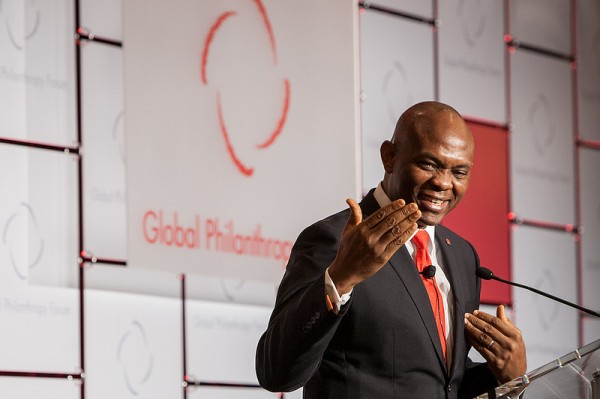Tony O. Elumelu Advises Western Development Partners on Africapitalism
‘No One Can Develop Africa But Us’
Tony O. Elumelu, C.O.N., Founder of The Tony Elumelu Foundation, in Washington, DC this week, told groups of philanthropy, business, and development leaders that Africa’s private sector must be the leading player in contributing to the continent’s economic transformation.
“We are now the world’s fastest growing region,” said Mr. Elumelu, who is also the Chairman of Heirs Holdings, an African proprietary investment company with a long-term investment horizon. “There is a social and economic impact to be derived, but it needs to be done with the right approach – with African leadership and with the private sector, rather than from a charitable orientation.”
The former Group CEO of United Bank for Africa (UBA), a pan-African financial institution with a presence in 19 countries and 3 continents, was in the United States capital to deliver a lecture to the International Finance Corporation (IFC), as well as to deliver a keynote speech, and participate in a plenary panel at the Global Philanthropy Forum. Mr. Elumelu was also in Washington, DC to honour the invitation of World Bank Group President Robert Zoellick to participate in a meeting of his Advisory Council of Global Foundation Leaders.
The business leader introduced the audience to Africapitalism, an economic philosophy that embodies the private sector’s commitment to the economic transformation of Africa through long-term investments that create both economic prosperity and social wealth.
“Investment in Africa needs a different perspective,” Mr. Elumelu told senior management and invited guests of the IFC on Monday. “For Africa’s economic growth, the private sector needs to take the lead, invest long term, and focus on making both economic and social gains. In my experience, we have made great profits, but we have also touched lives.”
Delivering a keynote at the Global Philanthropy Forum’s annual conference on Tuesday, Mr. Elumelu argued that old assumptions about how Africa would develop were changing quickly, with headlines about the continent becoming more positive. He described for the audience consisting mostly of global philanthropic leaders how The Tony Elumelu Foundation saw the need to partner with the private and public sectors to achieve the catalytic economic transformation it was seeking.
Using his past experience as a banker as an example, Mr. Elumelu said, “We wanted to democratise banking – at the time, it was an economic, not a social act. But we learned quickly that as we enhanced access to banking, the communities prospered. And as the communities prospered, we also did. The lesson for us is that, indeed, corporations can do well and do good simultaneously. If you integrate both, it can create even more wealth.”
The event’s moderator, Mark Kramer – who along with renowned Harvard University Professor of Strategy and TEF Founding Patron Michael Porter, co-founded FSG – commended the Foundation’s efforts in the areas of impact investing and business leadership development.
“Tony has made a compelling case for using the private sector for impact that is traditionally seen as only happening through philanthropy.”
Jane Wales, president and CEO of the Global Philanthropy Forum, added: “Tony Elumelu represents what we are seeing emerge as the future of global philanthropy. He is a successful business leader from Africa who has proven that you can do well while doing good, and is now developing innovations in African philanthropy that Western philanthropy can also learn and benefit from.”
On Wednesday, Mr. Elumelu met with other global philanthropy leaders as part of the World Bank Group Advisory Council of Global Foundation Leaders, hosted by the Group’s president, Robert Zoellick. The invited participants included founders and foundation presidents from the Bill and Melinda Gates Foundation, the Ford Foundation, the Carnegie Corporation, and other leading philanthropies in the United States, Europe, Asia, and Latin America.
The Advisory Council discussed a number of key issues for global philanthropy, including a discussion led by Mr. Elumelu focused on how foundations in fast growing emerging economies can partner with the World Bank and other developing world foundations to build their domestic philanthropic sectors through introducing legislation and setting high standards. He stated, “We have an emerging affluent class in Africa. Unfortunately, the institution of giving has not been professionalised. We need the legal structures in place to really leverage Africa’s own wealth to set the continent’s development agenda from within. Reacting to Mr. Elumelu’s comments on the importance of institutional philanthropy for African-led development, Mr. Zoellick added a discussion on African philanthropy to the agenda for a meeting later in the day with African finance ministers and bank governors.

